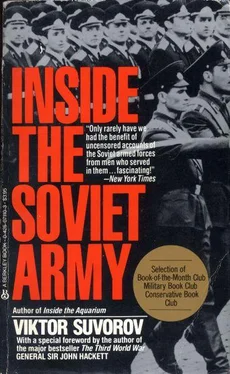I was successful and joined a battalion — 300 strong of young, shaven-headed new cadets. We were divided into three companies, each of three platoons. We were commanded by a lieutenant-colonel, who had a major as his deputy and political officer. The companies were commanded by majors, the platoons by captains and senior lieutenants. At that point we had no sergeants. In my own platoon of 33, only one had done his military service. All the rest had come straight from school. Evidently, not many of those who had already had the opportunity to see how an officer lived wished to take up the army as a career. The first night after the battalion had been formed we found ourselves on a troop train, in goods wagons. No one knew where we were going. We travelled for three whole days and then we arrived at a training division. Most of us had only the vaguest idea what this meant, but one cadet, who had already served in the army for two years, became quite agitated. He had certainly not expected this. During his army service with a tank unit, he had been a loader and he had therefore escaped service with a training division, but he had heard a lot about such units. And now he found himself in one, with a contingent of scum.
The battalion now acquired sergeants — of the type who run training divisions — and life began to gather speed. Reveille, PT, training exercises, disgusting food, cold, night alerts. And together with this, came orders such as `Take a matchstick, measure the corridor with it, and then come and tell me how long the corridor is'. Or, `Take your toothbrush and clean out the latrine. Report to me on the progress you've made by dawn'.
No higher education for you for the present, my friends; first we must make good soldiers out of you!
A training division knocks all the independence and insubordination out of you. You learn a lot while you are there. You are taught to understand others and to represent them. You learn how to recognise scoundrels and how to find friends.
The first lesson which you learn is that soldiers and future officers must not be afraid of tanks. During each of the first few days you spend several hours getting used to them. At first it is easy — you lie at the bottom of a concrete-lined trench while a tank roars round and round above your head, crushing the concrete with its tracks as it does so. Then things get a bit more complicated — you are told that you are to take shelter in an unlined slit trench, which you are to dig. You are told that, provided you make the trench narrow enough, you will be safe. However, you are also told to cover your head with your tunic, so that if the trench should cave in, you will have a few lungfuls of air, which should be enough to enable you to dig yourself out. Next, you are told that you will be given one and a half minutes to dig your trench — and to jump into it, curled up like a hedgehog. You can see the tank, waiting not far away. Both of you are given the signal to start at the same moment. You start digging like a mole, as the tank bears down on you…
And so you carry on, day after day, sweating your guts out, until you have spots in front of your eyes, until you vomit from fatigue, until you collapse with exhaustion.
There is a lot more fun to be had during the training, besides your introduction to tanks — napalm, gas, rubber protective clothing worn in the blazing sun, barbed-wire obstacles
`Accursed barbed wire obstacle
Creation of the 20th century
By the time a man has climbed across you
He is no more than half a man' — and the eternal pressure to save seconds. And the constant uncertainty…
After six months we finish the training course and the time for assessment irrives. Hitherto, we have worn ordinary soldiers' shoulder-boards, but now, after the course, we are given black velvet ones with the gold stitching and the red piping of the cadets of a Tank Officers Training College. But not all of us get these. Forty out of our 300 received the shoulder-boards of junior sergeants and were sent off to become tank commanders and tank gunners. Our College did not ever want to see them darken its doors again.
The battalion was reformed. Now it had only two companies, each of 130 cadets. We were sent back to the College for the next three and a half years.
4
The life of a cadet at a College is very little different from the one he led in the training division. The shoulder-boards are different, it is true, and he receives 10 rubles a month instead of 3. (In his third year he receives 15 and in his fourth 20.) And the food is better. But every College has a training centre. A cadet spends one or two weeks at the College studying theory — both military and civil. Then he goes to the training centre for the next one or two weeks. There he spends his time driving, shooting, doing night exercises, platoon engagements, encounter battles with tank companies, more driving, more familiarisation exercises with tanks and with napalm. More pressure to save seconds. More uncertainty.
You are constantly driven out of the College. The time you spend there only counts towards your army service if you are there for medical reasons. But since everyone is robustly healthy, this really does not apply.
One night, my friend Pashka Kovalev, who was already in his fourth year, with three months to go before he graduated, broke out of barracks. He had a girl-friend in Kharkov. He was away for three hours. He managed to get through the barbed-wire and other obstacles on his way back in without being spotted and he slipped quietly into bed. Before leaving, he had put his rolled greatcoat into the bed, and had laid out his dress uniform and boots beside it, in accordance with regulations. As a rule, anyone carrying out a kit inspection during the night would be sure to check that all footwear was properly displayed. But Pashka was clever — he made his unauthorised trip in running shoes.
Reveille, PT, and breakfast went by without incident. Then came the review period. There were about a thousand of us on parade. We stood, freezing, and listened to a string of orders issued by different authorities. These were read out in order of seniority: first came those from the Minister of Defence, then others from the Commander of the Military District, more from his director of training and, finally, those issued by the College Commandant. Suddenly, and without warning, Pashka was called out of the ranks and an order for his expulsion was read. His velvet shoulder-boards were ripped off and replaced with those worn by a private soldier. His absence had been detected by a surprise check during the night. The cadets who had been on guard duty that night were immediately arrested and thrown in the cells for ten days. Others were being woken up to take their place, as the commission which had made the check departed. They were told nothing of what had occurred. Pashka returned towards morning, crept in through a window in the latrines and got back into his bed. He did not realise that the guard had been changed and assumed he had got away with it. But, while he was breaking in, the order for his expulsion was being already drafted by the staff. It took no account of the four years he had spent at the College — four years which had made him feel that he was already almost an officer. He was sent to the training division at which we began our service.
Long afterwards, I heard that he had not been able to endure life in the training division, that he had finally refused to obey orders and had hit a sergeant. For this he was sent to a penal battalion for two years — which did not, of course, count as part of his military service. After this he would have been returned to the unit which had sent him to the penal battalion — the training division. Whether he ever did go back I do not know — I never heard anything more about him.
Читать дальше












